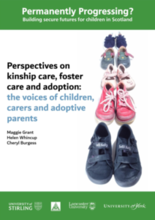Displaying 601 - 610 of 1177
This report has been completed as one part of the study Permanently Progressing? Building secure futures for children in Scotland which heard directly from children about their experiences.
After almost five years of detailed research and analysis, the reports of the Permanently Progressing study (phase one) were published on 20 June 2019. The study investigated decision making, permanence, progress, outcomes and belonging for a large cohort (1,836 children) of all children in Scotland who became looked after in 2012-13, when they were aged five or under.
This small pilot project was conducted to start to understand and compare the situation of grandmothers caring for children in a diverse range of countries when their parents are in prison.
This paper sets out to explore why formal kinship care has emerged in such a marked way in recent decades by investigating the emergence and development of formal kinship care in two neighboring jurisdictions in Europe where it now accounts for a substantial proportion of all care placements in Scotland and Ireland.
2019 marks the 20thanniversary of Scotland's flagship residential child care conference. SIRCC is an annual event in the calendar for those working with looked after children in Scotland. The conference will be held 4 & 5 June 2019 in Glasgow.
This study extends the research on the experiences and outcomes of siblings in care by comprehensively mapping sibling networks both within and outside the care system and measuring sibling estrangement (living apart and lack of contact) over time among children in Scotland.
Given that research identifies parental experiences of shame and humiliation in the child protection process, this article reports on a qualitative study that investigated how and why parents experienced such emotions within the English system.
This podcast episode describes what self-harm is and how social workers can support young people and carers who are self-harming.
"Up to 40 new areas will benefit from £15 million to expand promising innovative approaches to keeping families safely together," says this news release from the UK Department for Education.
This paper considers the importance of material objects for looked after and adopted children integrated as part of life story work practices.

